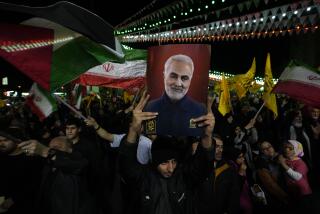Taliban claims responsibility for Kabul embassy attack
- Share via
KABUL, AFGHANISTAN, AND NEW DELHI — The Indian Embassy in Afghanistan’s capital came under attack Thursday for the second time in 15 months as a powerful bomb exploded along an exterior wall, killing 17 police officers and civilians, wounding 76 people and destroying vehicles and buildings.
The Taliban claimed responsibility for the suicide attack, which occurred in a heavily fortified area about 8:30 a.m. This latest blast in Kabul underscored the point, analysts said, that militants can strike at will even in Afghanistan’s most secure areas.
The attack raised suspicions in India of Pakistani involvement and concerns across the region that it could disrupt attempts to improve Indo-Pakistani relations.
The blast was heard across the city as shock waves shattered windows and a large plume of brown smoke rose hundreds of feet.
“We heard a big explosion, and smoke was everywhere,” said Ahmadullah, 22, a merchant who goes by one name. He was visiting friends a short distance from the embassy.
“They pulled out several dead civilians and a few dozen wounded. One of my friends in the house was injured by all the flying glass.”
The bomber drove a sport utility vehicle, Indian Foreign Secretary Nirupama Rao said.
On a Taliban website, spokesman Zabiullah Mujahid said the blast was the militant group’s handiwork, that the Indian Embassy was the target, and that Khalid, the bomber, was from the Paghman district of Kabul province.
The second major assault in the capital in less than a month comes as popular support for the eight-year war is waning in many participating countries. Last month, the Italian government threatened to withdraw its troops after a suicide bomber attacked a military convoy along Kabul’s airport road, killing six Italian soldiers and 10 Afghan civilians.
Roadside and vehicle bombs have become near-daily events in Afghanistan as President Obama considers a troop increase and more critics question whether the war is “winnable.”
In August, 51 American troops were killed, the highest monthly total of the war, according to independent website icasualties.org. And more than 170 Afghan civilians were killed, according to an Associated Press count.
India, a longtime Afghan ally, believed it was less of a target than many Western powers because of its political and cultural ties. That confidence was shattered in July 2008 when a massive attack on its embassy in Kabul killed 58 people, including two senior Indian officials, and injured 141.
That assault and the Thursday blast both occurred early in the morning, part of a pattern, a senior official said, in which bombers are kept up all night and deprived of sleep to make them more submissive, then taken to a vehicle loaded with explosives a short distance from the target.
Often different teams handle various parts of the operation, sometimes not even aware of one another’s identity, said the official, who requested anonymity for security reasons.
After the 2008 attack, the Indian government accused Pakistan’s spy agency, the Inter-Services Intelligence, of helping to plan the operation, though the Taliban claimed responsibility for carrying it out. Both the U.S. and India said at the time that they had found evidence that Pakistan’s spy agency was in touch with the attackers. Islamabad strongly denied any involvement.
Unnerved by the size and scope of that bombing, India fortified its embassy with high blast walls, heavy steel gates and a more circuitous entrance.
On Thursday, those changes were credited with saving lives. The blast failed to breach the embassy’s thick perimeter wall, although it damaged embassy buildings in the compound. No Indian nationals were killed or seriously injured.
G. Parthasarathy, a former diplomat and now an analyst at the Center for Policy Research in New Delhi, said it’s clear that the Taliban see Indian economic assistance in Afghanistan as complementary to American strategic objectives.
“Therefore, Indians are targeted,” he said.
“Add to that, their [the militants’] Pakistani mentors are not too happy with our presence in Afghanistan.”
Indian news media, citing government sources, were quick to suggest that Pakistan was behind the blast.
In Islamabad, Pakistani Foreign Ministry spokesman Abdul Basit condemned the bombing as part of a terrorist menace that should be eradicated, saying certain “elements” may be trying to sabotage efforts to improve long-strained relations between India and Pakistan.
The Afghan Foreign Ministry said the attack “was planned and implemented from outside Afghan borders” by the same groups responsible for the July 2008 suicide bombing. It did not mention Pakistan by name. But it had previously blamed Pakistan’s spy agency for last year’s bombing.
The attack on its embassy was not likely to prompt India to walk away from commitments in Afghanistan, which include more than $1 billion in development projects, said Phunchok Stobdan, a senior fellow at the Institute for Defense Studies and Analyses in New Delhi.
In other developments Thursday, the Afghan Defense Ministry said nearly 4,000 pounds of heroin and 50 tons of opium, worth millions of dollars on the street, had been seized and destroyed in the Kajaki district of Helmand province the day before in a joint operation involving U.S. and Afghan military forces. The statement also said 30 tons of explosives and 10 vehicles had been confiscated.
Afghan army commandos and U.S. special forces had a short, intense fight with insurgents before confiscating the contraband, the ministry said. During the operation, the Afghan and U.S. forces reportedly killed 17 insurgents and captured three.
--
Faiez is a special correspondent. Anshul Rana in The Times’ New Delhi Bureau contributed to this report.
More to Read
Sign up for Essential California
The most important California stories and recommendations in your inbox every morning.
You may occasionally receive promotional content from the Los Angeles Times.













